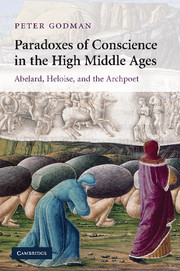Book contents
- Frontmatter
- Contents
- Preface and acknowledgements
- List of abbreviations
- 1 Moral moments
- 2 The neurotic and the penitent
- 3 True, false, and feigned penance
- 4 Fame without conscience
- 5 Cain and conscience
- 6 Feminine paradoxes
- 7 Sincere hypocrisy
- 8 The poetical conscience
- Envoi: Spiritual sophistry
- Bibliography
- Index of quotations
- General index
- CAMBRIDGE STUDIES IN MEDIEVAL LITERATURE
Preface and acknowledgements
Published online by Cambridge University Press: 30 September 2009
- Frontmatter
- Contents
- Preface and acknowledgements
- List of abbreviations
- 1 Moral moments
- 2 The neurotic and the penitent
- 3 True, false, and feigned penance
- 4 Fame without conscience
- 5 Cain and conscience
- 6 Feminine paradoxes
- 7 Sincere hypocrisy
- 8 The poetical conscience
- Envoi: Spiritual sophistry
- Bibliography
- Index of quotations
- General index
- CAMBRIDGE STUDIES IN MEDIEVAL LITERATURE
Summary
Outside the Vatican, where much of the research for this book was done, there stood, on almost every occasion I visited the papal library, a gentleman whose behaviour and appearance suggested that he had seen better days. His occupation was, to admonish passers-by. ‘Andate a confessarvi!’ (Go and confess!) he would bellow to impassive monsignori, indifferent tourists, and curious me. My curiosity was aroused less by what he repeated than by what he did not say. He did not say, for example: ‘Pentitevi!’ (Repent!), as an evangelical Protestant might have done. Instead he alluded to the redemptive power of a sacrament administered by the Roman Catholic Church.
That he had chosen the right place to do so, no one denied. Nor did anyone appear to pay the slightest attention. If I did, the reason was not only fellow-feeling with one of those whom others regard as cranks. As I worked on the feigning and mockery of confession which he advocated so solemnly, I imagined a dialogue with him on that subject which I did not muster the pluck to conduct in reality. And now it is too late, for, when my research drew to a close, its companion deserted his post near the Porta sant'Anna. If it would be too much to claim that I miss him, I still hear the echo of his admonition with melancholy gratitude.
The gratitude derives from the stimulus he provided to look at larger questions which the myopia of specialisation may not see.
- Type
- Chapter
- Information
- Paradoxes of Conscience in the High Middle AgesAbelard, Heloise and the Archpoet, pp. ix - xiiiPublisher: Cambridge University PressPrint publication year: 2009



